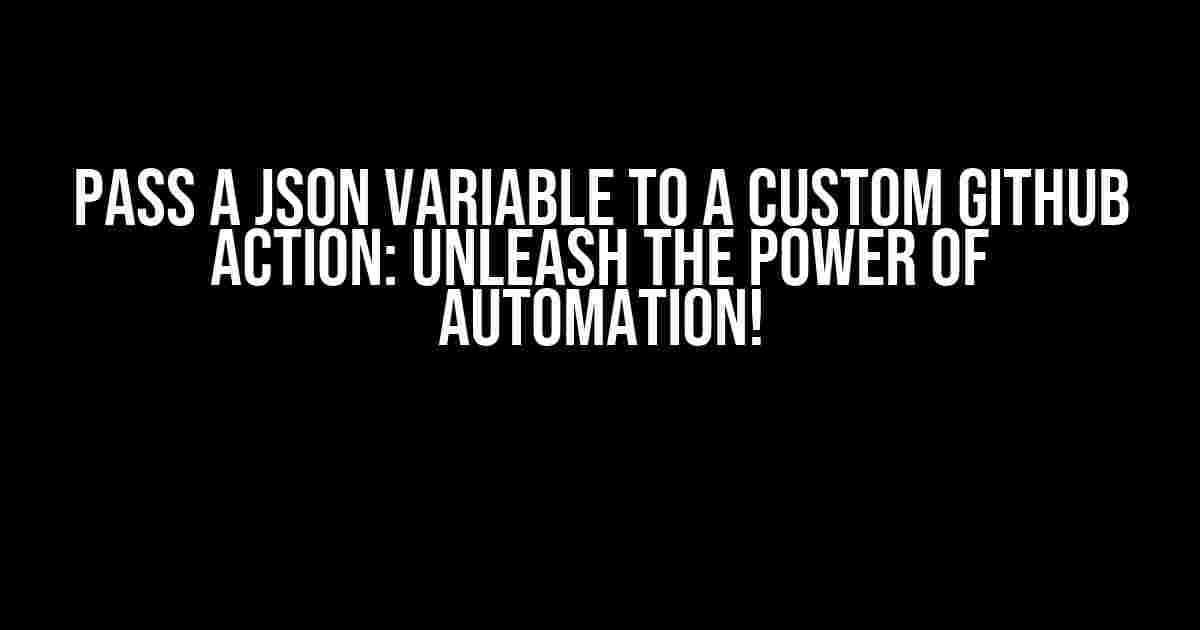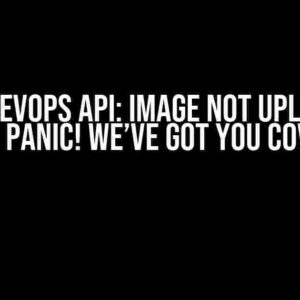Are you tired of dealing with tedious manual workflows in your GitHub repository? Do you want to take your automation game to the next level? Look no further! In this article, we’ll explore the magic of passing JSON variables to custom GitHub Actions, and show you how to harness the full potential of automation in your workflows.
What is a Custom GitHub Action?
A custom GitHub Action is a reusable piece of code that performs a specific task or set of tasks in your GitHub repository. Think of it as a mini-program that automates a particular process, like building and deploying your code, creating releases, or even sending notifications. The beauty of custom GitHub Actions lies in their flexibility and customizability, allowing you to tailor them to your specific needs.
Why Pass JSON Variables?
Passing JSON variables to a custom GitHub Action enables you to dynamically configure and fine-tune the action’s behavior. Imagine being able to pass parameters like API keys, environment variables, or even complex data structures to your action, and having it adapt accordingly. This level of control and customization unlocks a world of possibilities for automating complex workflows and integrating with external services.
Step 1: Create a New Custom GitHub Action
Before we dive into passing JSON variables, let’s create a new custom GitHub Action from scratch. Create a new directory for your action and add the following files:
action.yaml index.js package.json
Edit the `action.yaml` file to define your action’s metadata:
name: "My Custom Action" description: "A custom action that does something awesome" runs: using: "node12" main: "index.js"
In the `index.js` file, add the following code to define the action’s entry point:
const { context, github } = require('@actions/core');
async function run() {
console.log('Hello from my custom action!');
// Your action's logic goes here
}
run();
Finally, update the `package.json` file to include the necessary dependencies:
{
"name": "my-custom-action",
"version": "1.0.0",
"dependencies": {
"@actions/core": "^1.2.6"
}
}
Step 2: Define a JSON Input
To pass JSON variables to your custom action, you need to define an input in your `action.yaml` file. Update the file to include the following code:
name: "My Custom Action"
description: "A custom action that does something awesome"
inputs:
json_data:
description: "A JSON object containing custom data"
required: true
default: '{}'
runs:
using: "node12"
main: "index.js"
In this example, we’ve added a new `inputs` section that defines a single input called `json_data`. This input is required, and its default value is an empty JSON object `{}`.
Step 3: Access the JSON Input in Your Action
In your `index.js` file, update the code to access the `json_data` input using the `github.context` object:
const { context, github } = require('@actions/core');
async function run() {
const jsonData = context.inputs.json_data;
console.log(`Received JSON data: ${jsonData}`);
// Your action's logic goes here
}
run();
In this example, we’ve accessed the `json_data` input using `context.inputs.json_data`. The `context` object provides access to the action’s execution context, including input values.
Step 4: Pass a JSON Variable to the Action
To pass a JSON variable to your custom action, you need to create a workflow file (.yml) that uses your action. Create a new file called `.github/workflows/my-workflow.yml` with the following code:
name: My Workflow
on: [push]
jobs:
my-job:
runs-on: ubuntu-latest
steps:
- name: Checkout code
uses: actions/checkout@v2
- name: Run my custom action
uses: ./my-custom-action
with:
json_data: '{"key": "value", "another_key": 42}'
In this example, we’ve defined a workflow that triggers on push events and runs a single job called `my-job`. The job checks out the code and then runs our custom action, passing a JSON object with two key-value pairs.
Putting it All Together
With the workflow file in place, let’s see how it all comes together. When you push changes to your repository, the workflow will trigger and run the custom action. The action will receive the JSON variable as input and can use it to perform complex logic, such as:
- Using API keys to authenticate with external services
- Configuring environment variables for your application
- Processing complex data structures for machine learning models
- And more!
Tips and Variations
Here are some additional tips and variations to help you get the most out of passing JSON variables to your custom GitHub Actions:
Handling Complex Data Structures
When working with complex data structures, such as arrays or nested objects, make sure to JSON.stringify the input data before passing it to your action. This ensures that the data is serialized correctly and can be parsed by your action.
with:
json_data: '${toJson(["item1", "item2", "item3"])}'
Using Secrets and Environment Variables
You can also use secrets and environment variables to pass sensitive data to your action. This approach provides an additional layer of security and flexibility.
with:
json_data: '${{ secrets.MY_SECRET }}'
Validating JSON Input
To ensure that the input JSON data is valid, you can add validation logic to your action. This can include checking the data type, structure, and content to prevent errors.
if (!jsonData || typeof jsonData !== 'object') {
throw new Error('Invalid JSON input');
}
Conclusion
Passing JSON variables to custom GitHub Actions opens up a world of possibilities for automating complex workflows and integrating with external services. By following these steps and tips, you can unlock the full potential of GitHub Actions and take your automation game to the next level.
Remember, the key to successful automation is flexibility, customization, and creativity. With JSON variables, you can adapt your actions to fit your specific needs and requirements, making your workflows more efficient and effective.
So, what are you waiting for? Start building your own custom GitHub Actions today and take the first step towards automation nirvana!
| Step | Description |
|---|---|
| 1 | Create a new custom GitHub Action |
| 2 | Define a JSON input in the action.yaml file |
| 3 | Access the JSON input in the action’s code |
| 4 | Pass a JSON variable to the action in the workflow file |
Happy automating, and don’t forget to share your custom GitHub Actions with the community!
Frequently Asked Questions
Got questions about passing a JSON variable to a custom GitHub Action? We’ve got answers!
How do I pass a JSON variable from my GitHub Actions workflow file to my custom action?
You can pass a JSON variable as an input to your custom action using the `inputs` keyword in your workflow file. For example: `my-action: inputs: jsonVar: ‘${{ json Var_here }}’`. Then, in your custom action, you can access the JSON variable as an environment variable.
What if my JSON variable contains special characters or is very large?
If your JSON variable contains special characters, you can use triple quotes to enclose the JSON string, like this: `jsonVar: ‘${{ json “””${ Var_here }””” }}’`. For large JSON variables, consider storing them in a file and passing the file path as an input to your custom action. You can then read the file contents in your custom action.
How do I parse the JSON variable in my custom action?
In your custom action, you can use a programming language like Node.js or Python to parse the JSON variable. For example, in Node.js, you can use `JSON.parse(process.env.jsonVar)` to parse the JSON string into a JavaScript object. In Python, you can use `import json; json.loads(os.environ[‘jsonVar’])` to parse the JSON string into a Python dictionary.
Can I pass multiple JSON variables to my custom action?
Yes, you can pass multiple JSON variables as separate inputs to your custom action. For example: `my-action: inputs: jsonVar1: ‘${{ json Var_here1 }}’; jsonVar2: ‘${{ json Var_here2 }}’`. Then, in your custom action, you can access each JSON variable as a separate environment variable.
What if I need to modify the JSON variable before passing it to my custom action?
You can use a GitHub Actions workflow command like `echo` or `jq` to modify the JSON variable before passing it to your custom action. For example, you can use `jq` to filter or transform the JSON data before passing it as an input to your custom action.


